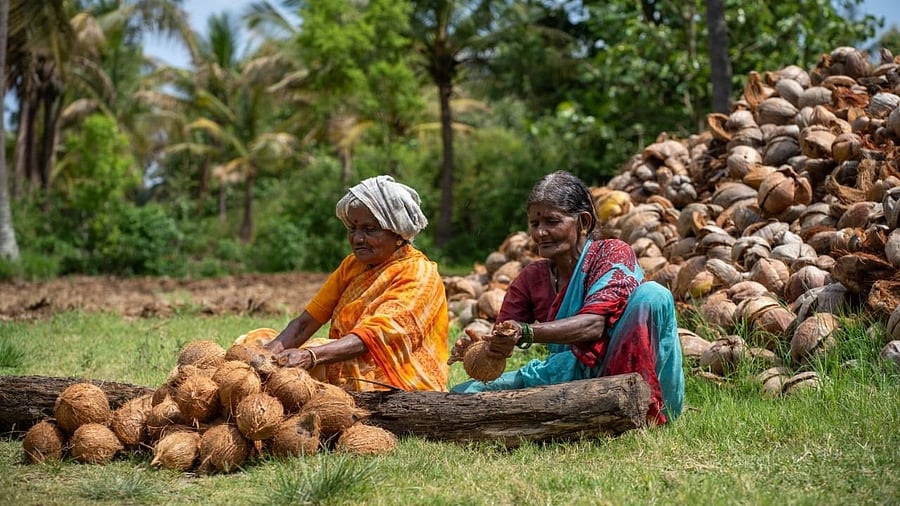
Credit: Special Arrangement
In the coconut-growing heartlands of Karnataka, the coconut tree is often revered as a kalpavriksha — the mythical wish-fulfilling tree. This reverence arises from the tree's extraordinary utility: Every part, from its leaves and flowers to the fibrous shell and nutrient-rich flesh, holds immense value in rural households.
Karnataka stands at the forefront of coconut production in India. According to the Coconut Development Board, the state harvested an impressive 595 crore coconuts in 2022–23, surpassing even Kerala, which produced 563 crore. This abundance not only sustains countless rural communities but also provides fertile ground for innovation.
Recognising the untapped potential of this versatile fruit, a few new-generation entrepreneurs in Karnataka are working to bring its benefits to urban consumers. Among them is Madhu Sagar, a former IT professional who, in 2017, shifted gears to embrace coconut-based farming and production as a path to sustainable development and rural revitalisation.
Raised in Arasikere taluk of Hassan district, Madhu grew up surrounded by coconut growers and was familiar with the health benefits and traditional uses of coconut oil. With each visit back to his hometown, his desire to create meaningful impact for agrarian communities grew stronger.
“Villages were emptying out. Many youth were going, or being sent, to cities in search of work. I began to wonder who would grow our food if this continued,” Madhu says. This conviction led to the founding of ‘Tengin’ — meaning "coconut" in Kannada — an enterprise built on the principles of zero-waste production.
Today, Tengin works closely with 30 to 40 farmers and women from self-help groups to produce a diverse range of coconut-based products. These include virgin coconut oil, coconut barfi, soaps, candles, sugar, chips, crockery made from shells and coir dish scrubbers.
To eliminate middlemen and establish a direct connection with consumers, Madhu initially set up a Google form and, more recently, launched a website for placing orders.
“I use coconut oil for a range of purposes — cooking, oil-pulling, on my hair and for skin health. Initially, I just wanted to support a grassroots enterprise, but after tasting the products, there was no looking back,” says Sujatha Prakash, an IT professional based in Bengaluru who regularly orders from the site. “The coconut oil is so pure, it can be eaten straight from the jar,” she adds.
Tengin’s operations revolve around traditional cold-press oil extraction methods, which help preserve the nutritional integrity of the coconut. Today, the brand sells over 500 litres of virgin coconut oil monthly, generating a revenue of Rs 3 to Rs 4 lakh.
Another standout product — coconut sugar — has captured consumer interest due to its lower glycemic index compared to refined sugar.
Other byproducts are popular too.“I regularly buy containers made out of coconut shells, and my family loves the coconut chips,” Sujatha says.
'Need value addition'
Most coconut-related industries in Karnataka still focus on traditional coir processing and basic coconut oil extraction. Despite being one of India’s top coconut-producing states, Karnataka has historically prioritised raw cultivation, limiting income opportunities for farmers, who remain vulnerable to fluctuating market prices for whole coconuts and copra.
Value addition has provided a measure of stability for people like Umesh, an employee at Tengin. “I have been working here for five years and was able to educate my two daughters — one in engineering and the other in nursing — because of the stable income,” he says. Before joining Tengin, Umesh worked as an agricultural labourer with just 20 guntas of land and would travel from village to village peeling coconuts. “I used to earn 25 to 50 paise per coconut. Here, I get paid Rs 1 per coconut. It works out well for me,” he adds.
A similar desire to build sustainable livelihoods led Manigandan Kumarappan to start Evlogia Eco Care — an organisation focused on converting agricultural waste into biodegradable cutlery. In 2018, he and his wife launched an e-commerce platform delivering half-trimmed coconuts, where they noticed the widespread use of plastic straws. “That observation sparked the idea of creating biodegradable straws from fallen coconut leaves, leading to the birth of our leaf straws,” he says.
These straws are made through a seven-step process that includes cleaning, sterilisation, roughening and rolling the leaves. “The straw remains intact for up to 30 minutes in hot beverages and six hours in cold drinks. Compared to paper straws, which disintegrate quickly, this is a good alternative,” says Krishnaji G, a vendor who supplies the straws to restaurants. Costing Rs 2 to manufacture, each straw is sold at Rs 2.50.
To scale up production, Kumarappan partnered with self-help groups in Tamil Nadu and Karnataka to handle different stages of the manufacturing process. “I have had a stable income for five years, and I feel proud about making an alternative to plastic straws,” says Sahana Jayasheela, who rolls the straws in Anjanapura, on the outskirts of Bengaluru.
Despite Karnataka’s dominance in coconut cultivation, the state has yet to reach its full potential in value-added processing. “Even compared to Tamil Nadu and Kerala, Karnataka has fewer value-addition industries — just about 53 in total,” says a senior official from the Coconut Development Board.
“There is also a need to promote exports, especially of coconut-derived products like medium-chain triglyceride (MCT) oil, which is in high demand globally for uses ranging from skincare to health supplements,” he adds.